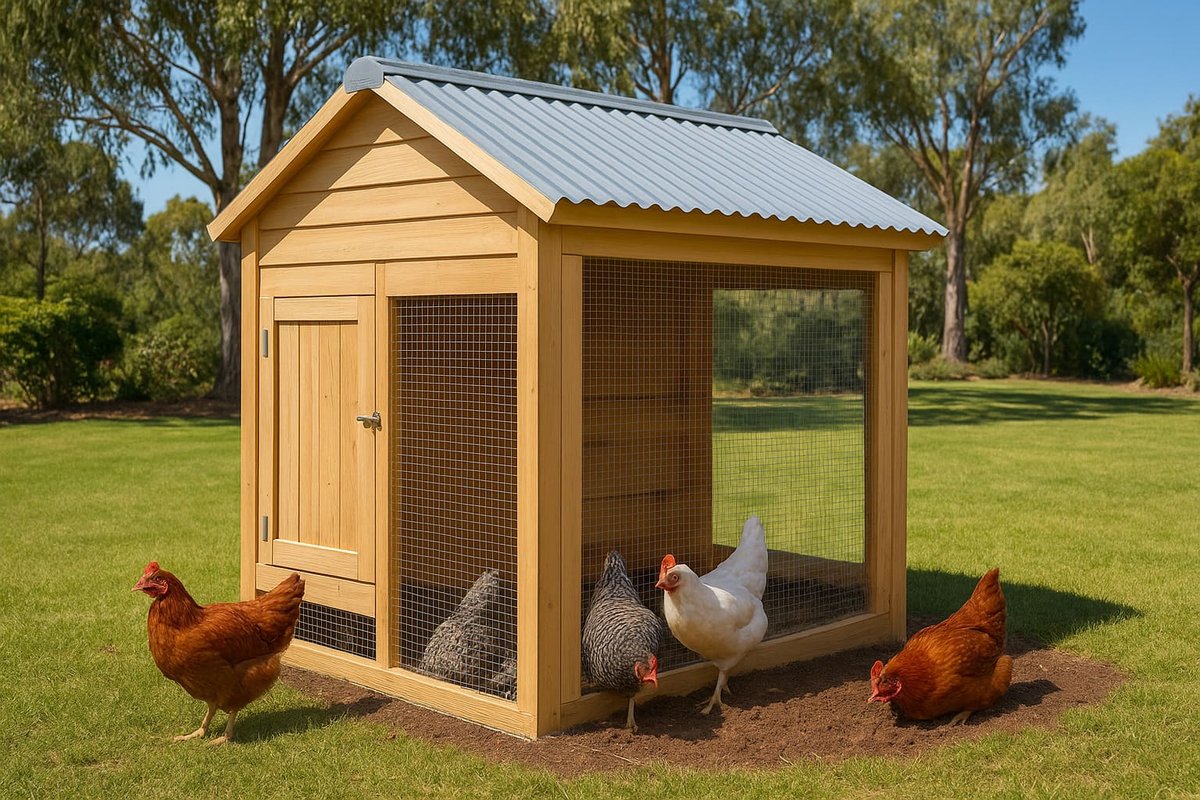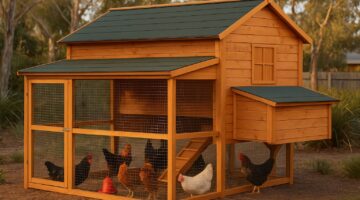Living in Australia and keeping backyard chooks means you’re going to cross paths with snakes. Finding a carpet python coiled in your nesting box or, worse, an eastern brown snake near your coop, is a stressful experience. But don’t let it put you off! As a backyard chicken owner in Sydney, I’ve learned that with a bit of planning, you can make your coop a snake-proof fortress.
If you’re asking “what keeps snakes away from a chicken coop?” or “how do you build a snake proof chicken coop?”, you’ve come to the right place. Snakes are looking for an easy meal (eggs, chicks, or the rodents eating your chicken feed), and our job is to make it impossible for them to get in.
This guide will walk you through everything. We’ll cover building a predator-proof coop, using the right materials, understanding what really works to deter snakes (and what doesn’t), and specific tips for different parts of Australia. We’ll base our advice on recommendations from official sources like the Department of Agriculture (DAFF), wildlife groups like WIRES, and Poultry Hub Australia, mixed with real-world experience.
Disclaimer: This guide is based on personal experience and public guidelines from bodies like the Department of Agriculture, Fisheries and Forestry (DAFF) on biosecurity and hygiene. It’s for information only and not professional veterinary or building advice. Always check local council regulations and your state’s specific chicken laws by state before building.
Understanding Snake Threats to Your Chicken Coop in Australia
Before we start building, we need to know what we’re up against. In Australia, the main snakes that trouble chicken coops are carpet pythons (after eggs and chicks) and venomous snakes like eastern brown snakes and red-bellied black snakes (often hunting rodents near the coop, but they will take a chick if they can).
What time of year are snakes most active?
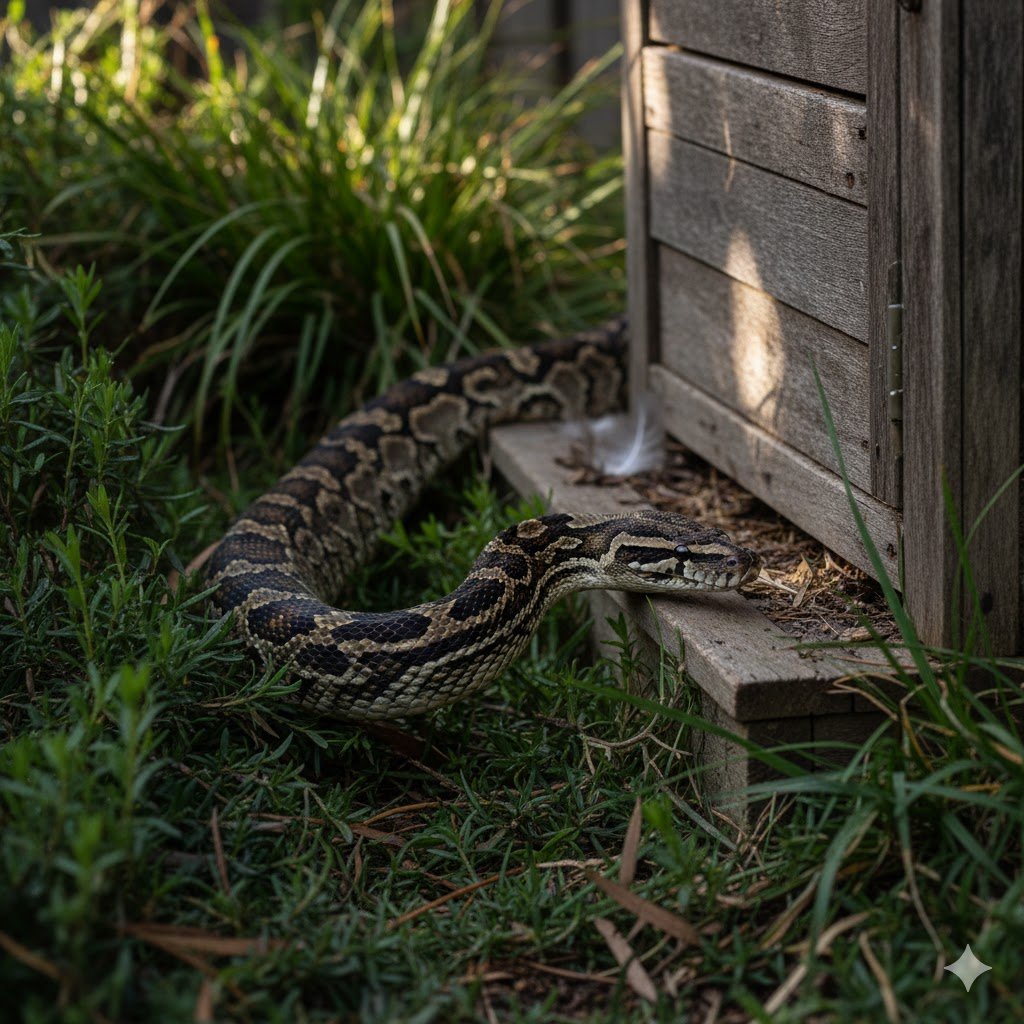
Snakes are “ectothermic,” which just means they get their body heat from the sun. They are most active in the warmer months, generally from September to April. During the cold winter, they go into a state called “brumation” (the reptile version of hibernation), where they are sluggish and hide away.
However, with Australia experiencing warmer winters (as noted in CSIRO climate reports), this “off-season” is shrinking. Don’t get complacent in winter; a warm, sunny winter’s day can be enough to bring a snake out to bask on a warm rock or, worse, under the metal roof of your coop.
What time of day are snakes most active in Australia?
This depends on the season.
- Spring & Autumn: Snakes are most active during the middle of the day, when it’s warmest.
- Hot Summer: They’ll switch their behaviour to avoid the scorching heat. On a 40°C day, snakes will be most active at dawn and dusk, and even into the night if it stays warm. This is prime time for your chooks to be roosting, making them vulnerable.
Will snakes eat full grown chickens?
This is rare. A fully grown, healthy chicken is a big meal that can fight back. A large carpet python might take a small bantam, but it’s not their preferred food. Most of the time, snakes are after the “easy wins”:
- Eggs: Pythons and goannas love chicken eggs.
- Chicks: Baby chicks are the perfect size for almost any snake, including venomous ones.
- Rodents: This is the big one. Mice and rats eat spilled chicken feed, and snakes eat the mice and rats. Your coop is a one-stop-shop diner.
Will garter snakes eat chicken eggs?
You might read about garter snakes online, but they are not native to Australia. Our equivalent snake that fills that role is a carpet python, and yes, they absolutely will eat chicken eggs.
What is the number one killer of chickens?
In Aussie backyards, the number one killer of chickens is predation. Research on poultry mortality from Poultry Hub Australia shows predation (foxes, snakes) and disease are top causes. Disease and parasites (like mites or internal worms) are another major killer, which is why a clean coop (which also deters rodents) is so important.
What do snakes hate most?
Snakes hate two things above all else: exposure and disturbance. They are fearful creatures that rely on cover and stealth. They hate:
- Open, clear ground (like mown lawns) where birds of prey can see them.
- Secure, solid barriers they can’t find a way through.
- A lack of food (no rodents) or water.
- Some strong smells (which we’ll cover), but these are far less reliable than barriers.
As someone who learned the hard way in my old QLD backyard after losing three chicks to a python, a clean yard and a secure coop are non-negotiable. In Tasmania, the risk is lower due to the cooler climate (they only have three species: tiger, copperhead, and white-lipped), but you should still proof your coop, as tiger snakes are common and highly venomous.
Understanding which snakes to look for and when they are active is the first step. Now, let’s turn that knowledge into action and build a fortress for your flock.
What Keeps Snakes Away from a Chicken Coop? Physical Barriers First
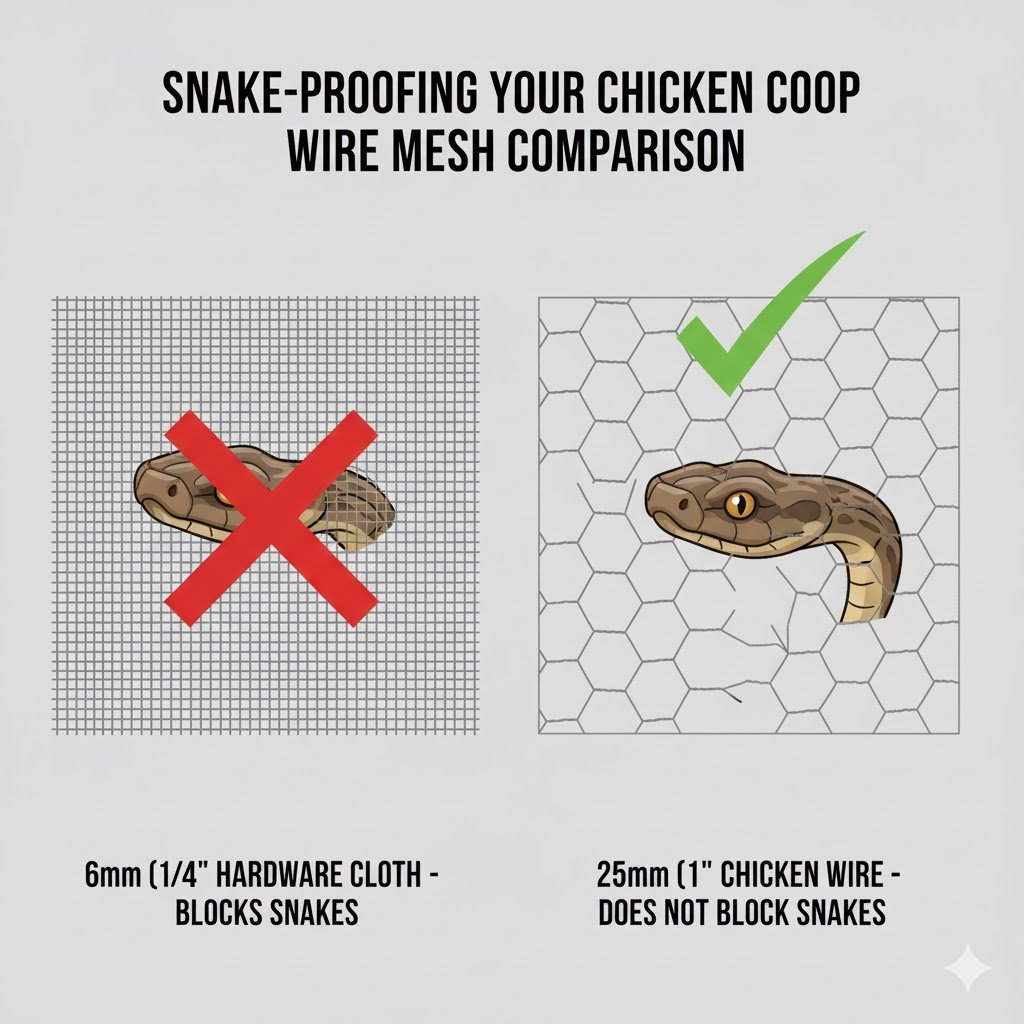
You can’t rely on smells or magic vibrating pegs alone. A physical barrier is the only proven way to keep a snake out. This section is the most important, and it answers “how do you build a snake proof chicken coop?” in detail.
How Do You Build a Snake Proof Chicken Coop?
Building a snake-proof coop, or retro-fitting your existing one (see our general predator-proofing guide for more), involves a few key, non-negotiable steps. If you’re starting from scratch, you might want to check out these plans for a budget-friendly coop or plans for a larger flock of 20 chickens.
- Start with a Solid Base: A solid concrete slab or heavy pavers are the gold standard. Snakes can’t burrow through it. If you have a coop with a timber floor, you must check for gaps and line the entire floor with mesh. If you have a dirt-floor run, you must use the “apron” method below.
- Use the Right Mesh (This is CRITICAL): This is where most people go wrong.
- Do NOT use “chicken wire” (the wide hexagonal wire). Snakes and quolls can slip right through it, and foxes can chew it.
- You MUST use “hardware cloth” (also called aviary mesh or snake mesh). This is a strong, square, welded wire.
- The mesh size MUST be 6mm (1/4 inch) or smaller.
- Cover EVERY Opening: Cover all windows, vents, and any gap with this 6mm hardware cloth. Secure it with screws and washers, not just staples, as staples can be pushed out.
- Create a Mesh “Apron” (For Dirt Floors): If your chicken run is on grass or dirt, snakes can (and will) dig under the walls. To stop this:
- Dig a trench 30cm deep and 30cm wide around the outside of your run.
- Lay the mesh down into the trench, bend it 90 degrees (like an “L” shape) to face outwards, away from the coop.
- Bury it with soil and pavers.
- When a snake or fox tries to dig at the wall, they hit this underground mesh barrier and give up.
- Build a Solid “Snake Proof Fence”: A dedicated snake proof fence around the coop is a great idea. Use 900mm high snake-proof mesh, ensuring the bottom is buried or sealed to the ground. You can also angle the top outwards at 30 degrees to stop them from climbing over.
- Fix All Gaps: Get down on your hands and knees and think like a snake. Is there a 1cm gap under your door? That’s a doorway for a young brown snake.
- Install a solid threshold or rubber door sweep.
- Use weather stripping around the door frame and nesting box lids.
- Fill any holes (like drill holes for perches) with silicone. For real-world examples, the Bunnings Workshop community has great tips on attaching mesh.
You can get all these materials down at Bunnings. Look for products like Jack Mouse Mesh (6.5mm) or other welded wire aviary meshes. Expect to pay around $40-$60 for a 10m roll.
Snake Proof Chicken Coop Australia: Tips for Your Backyard
- For NSW/QLD: Your biggest challenge is balancing ventilation with security. In our hot, humid summers, you need airflow to prevent heat stress. Getting this balance right is tricky; see our full guide on how much ventilation a chicken coop needs for more details.
- For Tasmania: Your focus is different. While snake-proofing, you also need to wind-proof and insulate your Chicken Coop Tasmania. Ensure your mesh is securely fastened to handle strong winds and that your solid walls have no gaps.
Fox Proof Chicken Coop Australia (Bonus for Multi-Predator Protection)
The great news? The steps for how to build a snake proof chicken coop are almost identical for a fox proof chicken coop Australia.
- The 6mm hardware cloth is too small for a snake and far too strong for a fox to chew.
- The solid base stops both from digging in.
- The buried mesh “L” apron that stops a snake from digging under is the exact same method used to stop a fox.
- You get two-for-one protection. For added fox security, you can run a single strand of hot wire (from an electric fence kit) around the base (15cm high) and top of your run. The principles are similar worldwide, though our guide focuses on AU snakes (for UK-specific fox tips, see this guide).
Materials Comparison: What is the Best Snake Proof Mesh?
| Material | Keyword Fit | Pros | Cons | Bunnings Price (Approx) |
|---|---|---|---|---|
| 6mm (1/4″) Hardware Cloth | “Best snake proof mesh for chicken coops Australia” | Blocks all snakes, even babies. Strong. | More expensive, less flexible. | $40-$60 / 10m roll |
| 12mm (1/2″) Hardware Cloth | “Can snakes get through half inch hardware cloth?” | Cheaper, more common. Stops large snakes & foxes. | No. Young brown snakes CAN get through. | $30-$40 / 10m roll |
| “Chicken Wire” (Hexagonal) | “Snake proof chicken wire” | Cheap and flexible. Good for keeping chooks in. | Useless for predators. Snakes, quolls, and foxes can get through easily. | $20-$30 / 10m roll |
The Verdict: Do not risk it. Use 6mm (1/4 inch) mesh. A snake’s head is the size of its body, and if its head fits, it’s in.
These physical barriers are your primary, non-negotiable line of defence. But once the coop is secure, we can add a secondary layer by managing the environment around it to make it less inviting.
Natural Repellents: What Smell Do Snakes Hate the Most in Australia?
Okay, your coop is now Fort Knox. But what about the areas around the coop? This is where we talk about repellents, and frankly, where there are a lot of myths. This DIY snake repellent for coops section covers natural options to supplement your barriers.
Honest truth: No repellent is 100% effective. The best “repellent” is a clean, tidy yard. But if you’re looking for what smell do snakes hate the most in Australia? Some strong scents can act as irritants and make a snake think twice.
What Is the Best Homemade Snake Repellent?
The most effective (and safest) homemade snake repellents are smell-based.
- Garlic & Onion Spray: This is my go-to. Mince 10 cloves of garlic and one large onion. Mix with 2-3 tablespoons of chilli powder and 4 litres of water. Let it sit in the sun for a day, then strain it into a spray bottle. Spray it around the perimeter of your coop and run, not inside. It’s a strong irritant that snakes don’t like.
- Clove & Cinnamon Oil: Snakes (and many pests) hate the smell of eugenol, which is found in clove and cinnamon oil. Mix 10-15 drops of each with 4 litres of water and a squirt of dish soap (to help it mix). Spray around the outside.
- Vinegar: The strong acidic smell of white vinegar can deter snakes. You can spray it directly on the ground around the coop, or soak rags in vinegar and place them in tin cans (with holes) around the garden.
Re-apply any spray repellent after rain or every 2-3 weeks.
Do Coffee Grounds Keep Snakes Away?
This is a common question. The short answer is no, not really. There is no scientific evidence that coffee grounds deter snakes. In fact, a big, damp pile of coffee grounds might just provide a nice hiding spot for insects and slugs, which could attract lizards or snakes. Don’t rely on it.
Will Mothballs Keep Black Snakes Away?
DO NOT USE MOTHBALLS. This is critical.
- They are highly toxic: Mothballs (naphthalene) are a poison. They are incredibly dangerous to your chickens, your family pets, and your kids. If a chicken eats one, it will likely die.
- They are ineffective: The scent isn’t strong enough in an open-air environment to deter a snake. Wildlife groups like WIRES constantly rescue animals poisoned by mothballs that were used “off-label” like this.
- It’s illegal: Using a pesticide for any purpose other than what’s on the label is illegal in Australia. The TGA confirms naphthalene is toxic, and it’s not an approved agricultural chemical for this use by the APVMA.
Will Peppermint Oil Repel Snakes?
Maybe, but don’t count on it. Like clove and cinnamon, peppermint oil is a very strong scent that snakes may find irritating. You can soak cotton balls in peppermint oil and place them in tin cans (with holes punched in them) around the coop perimeter. It’s a lot safer than mothballs, but it’s not a reliable barrier. It will fade quickly and needs to be replaced every few days.
What About Solar-Powered Snake Repellers?
You’ve seen them at Bunnings—the pegs you stick in the ground that vibrate. The theory is that snakes mistake the vibration for a predator (like a kangaroo) and stay away.
- The Science: There is zero scientific evidence that these work.
- The Reality: Many people (myself included) have found snakes sunning themselves right next to one of these repellers. They are a waste of money. Snakes are deaf and sense vibrations, but they quickly learn that a constant, low-level buzz is not a threat.
5 Homemade Deterrents (The Good, The Bad, and The Useless)
| Deterrent | How it Works | Verdict (for Aussie Coops) |
|---|---|---|
| 1. Garlic & Chilli Spray | Strong irritant smell. | Good (as a supplement). Safe for chooks, cheap. Re-apply often. |
| 2. Clove & Cinnamon Oil | Strong smell (eugenol). | Good (as a supplement). Smells nice, non-toxic. |
| 3. Tidy Yard | Removes hiding spots. | EXCELLENT (Essential). The best “repellent” there is. Free! |
| 4. Mothballs | Toxic poison. | DANGEROUS & ILLEGAL. Do NOT use. Will harm chooks. |
| 5. Prickly Plants | (e.g., Grevilleas, Hakeas, Roses). Physical discomfort. | Moderate (as a barrier). Won’t stop a snake, but a dense hedge may make them go around. |
Final word on repellents: They are a supplement, not a solution. Don’t bet your chickens’ lives on them.
So, we’ve learned that most repellents are myths, and the best way to “repel” a snake is to remove its cover and its food. This brings us to the most important indirect action you can take.
Rodent-Proofing Ties In: How to Rodent Proof Your Chicken Coop?
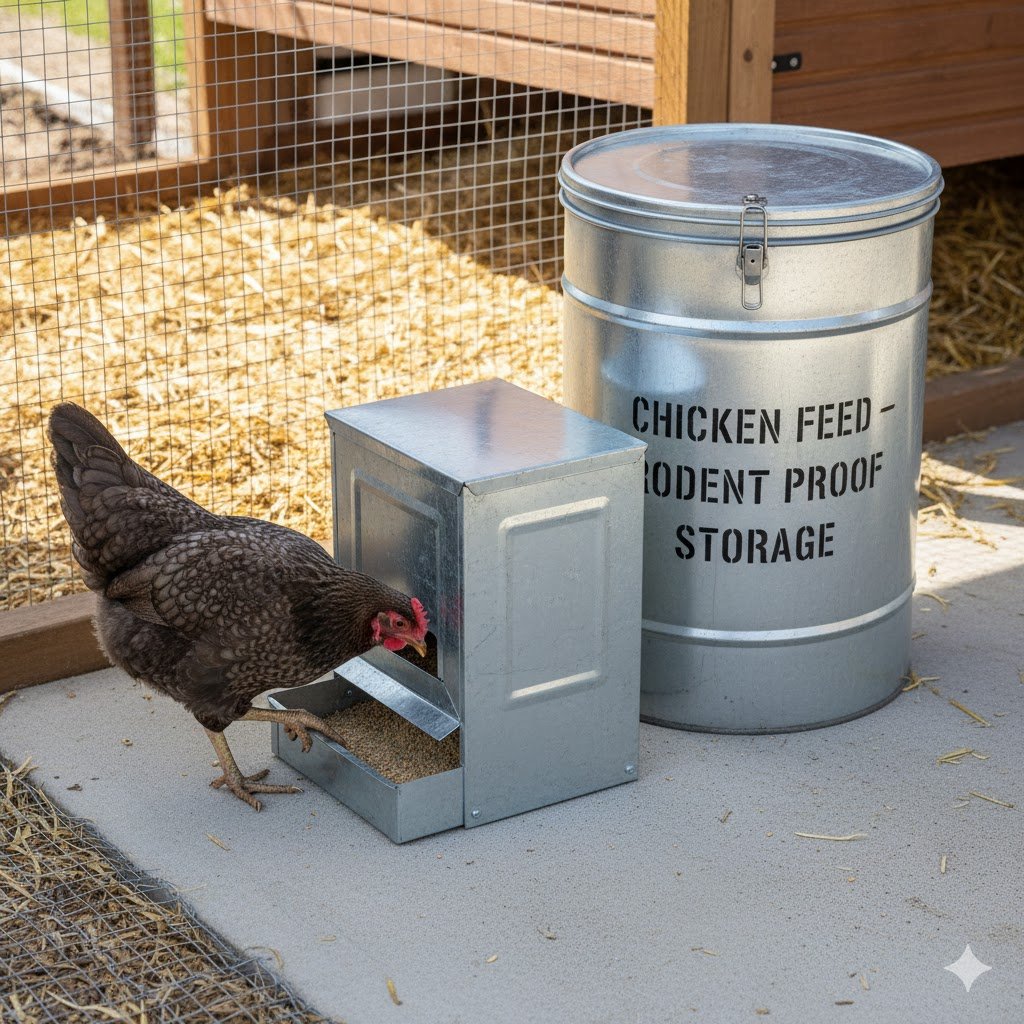
This is one of the most important parts of snake-proofing. For a deep dive, read our full guide on how to keep rats out of your chicken coop. If you ask “what keeps snakes away?” the best answer is “no food!” This section is arguably more important than repellents. If you have no rats, 90% of your snake problem disappears.
Snakes are drawn to coops not just for eggs, but for the rats and mice that feast on spilled chicken feed.
- Get a Treadle Feeder: This is the best investment I ever made. It’s a metal feeder with a lid that only opens when a chicken stands on the step. Rats and mice aren’t heavy enough to open it. You can find them at Bunnings or your local produce store.
- Store Feed in Metal Bins: Do not store bags of feed in your shed or coop. Rats will chew through the plastic or paper bags in minutes. Use a metal rubbish bin or feed silo with a tight-fitting lid.
- Clean Up Spills: Don’t leave feed scattered on the ground. Rake it up before dusk.
- Remove Water at Night: Water sources attract all kinds of wildlife. If you can, remove the main waterer from the run at night and just leave a small one inside the secure coop.
Good Coop Housekeeping is Snake-Proofing
- Collect Eggs Daily (or Twice Daily): Don’t leave eggs in the nesting box overnight. This is the #1 reward for a python.
- Clean Up Droppings: Piles of droppings attract flies, which attract lizards, which attract snakes. This is also why knowing how to keep a chicken coop from smelling is key to predator and health management.
- Keep Grass Mown: Mow the grass right up to the edge of the coop and run. Snakes will not cross an open, exposed area if they can avoid it.
- Remove Hiding Spots: Get rid of that pile of old timber, the sheet of corrugated iron, or the pile of empty pots near your coop. Deciding on the best place to put your chicken coop (away from bushland edges and junk piles) is your first step. These are all 5-star hotels for a snake.
By making your coop a clean, food-free, and water-wise zone, you’ve removed the main “pull” factor for snakes. Now, let’s look at your options if you’re buying a coop instead of building.
Buying Options: Snake Proof Chicken Coop for Sale & Bunnings Picks
What if you’re not a DIY person? You can buy pre-made coops. But be careful—many coops labelled “predator-proof” are not snake-proof. As Australian manufacturers like Somerzby point out, the key is the mesh size. You must be a critical shopper.
Snake Proof Chicken Coop Bunnings
Bunnings sells a range of flat-pack coops.
- Flyline XL ($300 approx): This is a popular model. It’s a good start, but you will need to modify it. The mesh it comes with is often 12.5mm, which is not snake-proof. You will need to buy rolls of 6mm mesh and line the entire thing.
- Somerzby (Sold at Bunnings Marketplace): Some models are tougher, but again, check the mesh.
The honest truth: No flat-pack coop under $500 is truly snake-proof out of the box. You must plan to spend an extra $50-$100 and a weekend reinforcing it with 6mm hardware cloth.
Snake Proof Chicken Coop for Sale Australia
Some brands specialise in predator-proof coops. When shopping, you must ask the right questions.
- Somerzby Coops: Their “Chalet” model often features 10-11mm mesh. This is better, but as we’ve learned, it’s still not snake-proof for young snakes. (Personal tip: I bought a Somerzby and upgraded the mesh on the vents myself—it was a weekend job and well worth it!)
- Royal Rooster: This is a premium brand, and many of their coops are designed to be fox and snake resistant, but you must check the specs on the specific model. Some owners also adapt A-Frame chicken coop designs, as their solid-panelled sides can be easier to seal.
- What to Ask the Seller: Before you buy anysnake proof chicken coop for sale, ask them:
- “What is the exact mesh size in millimetres?” (If they say “half-inch” or “1.2cm”, it’s not good enough).
- “Is the floor solid, or does it have mesh? What size?”
- “Are there gaps at the door, nesting box lid, or vents?”
Chicken Coop Tasmania
If you’re looking for a Chicken Coop Tasmania on places like Gumtree, prioritise insulated, solid-walled coops for the cold. You’ll almost certainly need to plan to add the snake-proof 6mm mesh to all vents and doors yourself, so factor that into your budget.
Whether you build or buy, a secure coop is essential. But you also have allies in the Aussie backyard that can help you out as a final layer of defence.
Natural Allies: What Is a Snake’s Worst Enemy? What Birds Keep Snakes Away?
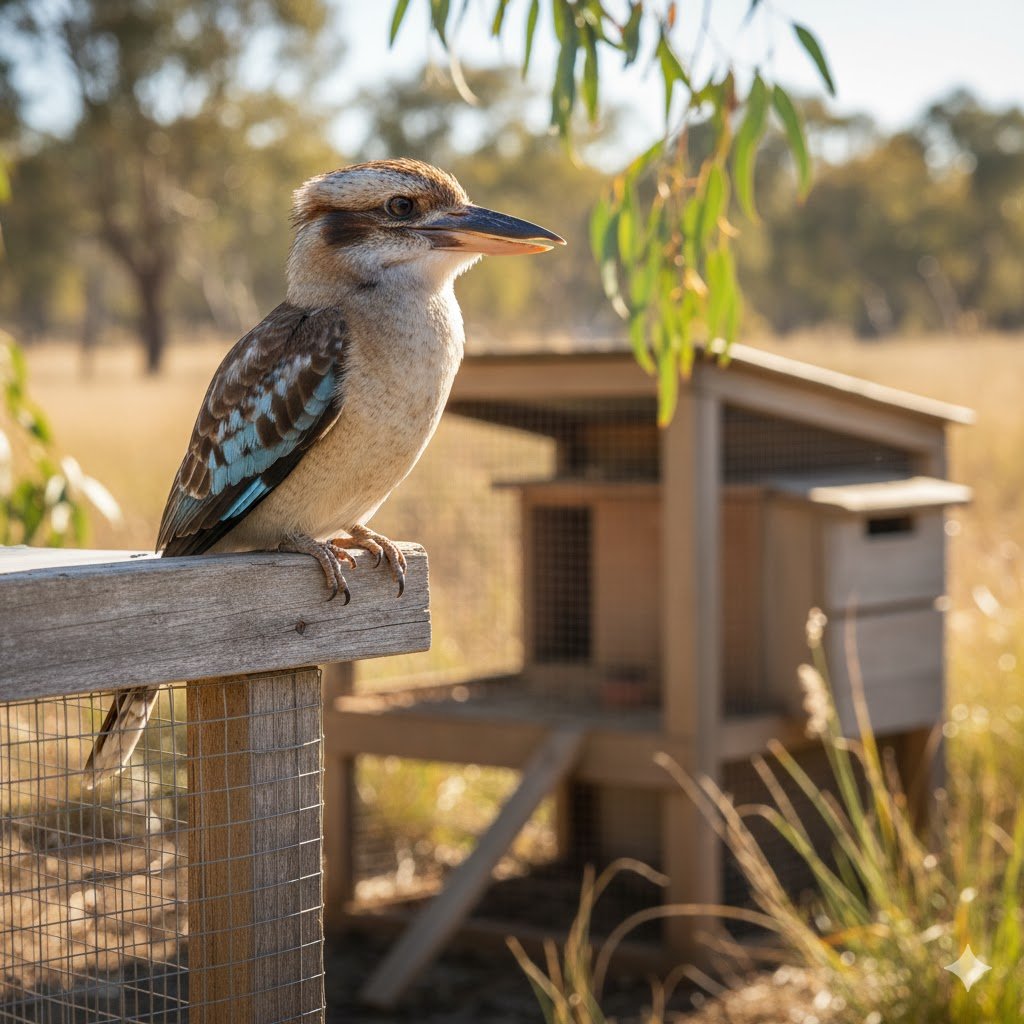
You have a security team in your own backyard! What is a snake’s worst enemy? Birds. Several Aussie birds are famous for hating snakes and will either chase them away or kill and eat them.
Top Birds That Keep Snakes Away:
- Kookaburras: The ultimate snake predator. They will swoop down, grab a snake, and smack it against a branch until it’s dead.
- Magpies & Currawongs: Highly intelligent and territorial. A family of magpies will mob and swoop any snake that enters their patch until it leaves.
- Guinea Fowl: These guys are the best “alarm system” you can own. They are not native, but many farms keep them. They will spot a snake from 50 metres away and set up a deafening, non-stop racket, which often scares the snake away and alerts you to the problem.
How to Encourage Them:
- Plant native trees (like gums) to give kookaburras and magpies a perch.
- Put out a bird bath (away from the coop) to attract them.
- Never leave out poison (like rat bait), as this will kill these helpful birds.
A flock of adult, healthy chickens will often defend themselves against a small snake. They may even kill and eat it. However, you should never rely on this. A venomous snake can easily kill a chook that gets too close, and a python can win a fight against a single chicken.
Relying on birds is a bonus, not a plan. The real plan is the one you put in place with 6mm mesh, a solid floor, and excellent rodent control. Let’s wrap it all up.
Conclusion: Your Aussie Coop Can Be a Fortress
Protecting your chooks from snakes is a must-do for any Aussie backyard chicken keeper. It might seem like a lot of work, but getting it right the first time will save you from heartache later. For a basic DIY retrofit, you can expect a total cost of $100–$300, which includes about $50-$80 for a good roll of 6mm mesh from Bunnings.
To recap the most important steps for how to snake-proof your chicken coop:
- Use 6mm (1/4 inch) hardware cloth on every single opening.
- Install a solid floor (concrete/pavers) or a buried mesh “apron”.
- Seal all gaps under doors and around nesting boxes.
- Rodent-proof your coop with a treadle feeder and metal feed bins.
- Keep your yard tidy and grass mown to remove all snake hiding spots.
A weekend of work and a trip to Bunnings for some quality mesh is all it takes to make your coop a fortress. Your chooks are relying on you, and now you have the knowledge to keep them safe. As a final step, be sure to perform a regular chicken health check to ensure your flock is happy and healthy in their fortress.
Frequently Asked Questions (FAQ)
What keeps snakes away from a chicken coop?
The only 100% effective method is a physical barrier. This means lining the entire coop (vents, windows, floor) with 6mm (1/4 inch) hardware cloth and ensuring there are no gaps. A clean, rodent-free coop is the best deterrent.
What smell do snakes hate the most in Australia?
Snakes dislike strong, irritating smells. What do snakes hate most? The smell of garlic, onion, chilli, clove, and cinnamon can act as mild deterrents. A homemade garlic/chilli spray around the outside of the coop can help, but it is not a replacement for a physical barrier.
How to rodent proof your chicken coop?
The best way is to use a treadle feeder (which rats can’t open) and store all your feed in sealed metal bins. Clean up any spilled feed daily and remove water sources from the run at night.
Can snakes get through half inch hardware cloth?
Yes. While 12mm (half-inch) mesh will stop large snakes and foxes, it will not stop a young brown snake or a small red-bellied black snake. You must use 6mm (1/4 inch) mesh for full protection.
What time of year are snakes most active?
In Australia, snakes are most active during the warmer months, from September to April.
What time of day are snakes most active in Australia?
On hot summer days, snakes are most active at dawn and dusk. In the milder spring and autumn, they are more active in the middle of the day.
Do coffee grounds keep snakes away?
No, this is a myth. There is no evidence that coffee grounds deter snakes. They may even attract other pests.
Will mothballs keep black snakes away?
No. Mothballs are ineffective in an open-air environment and are highly toxic to your chickens, pets, and local wildlife. It is also illegal to use them for this purpose.
What birds keep snakes away?
Kookaburras, magpies, currawongs, and guinea fowl are all known to attack, mob, or chase snakes away. Encouraging these birds with native plants and a bird bath can add an extra layer of security.

Oladepo Babatunde is the founder of ChickenStarter.com. He is a backyard chicken keeper and educator who specializes in helping beginners raise healthy flocks, particularly in warm climates. His expertise comes from years of hands-on experience building coops, treating common chicken ailments, and solving flock management issues. His own happy hens are a testament to his methods, laying 25-30 eggs weekly.
